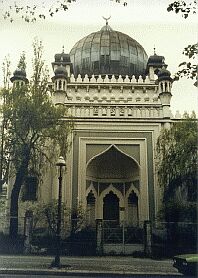June 23, 2005
Wilmersdorfer Moschee/ Wilmersdorf Mosque

At a conference at the Federal Office for Migration and Refugees entitled: “Islam and Integration,” the typical problems of whether Turkish culture or the Islamic faith was at fault and other such unanswerable academic questions were continually raised. One panellist, in an attempt to show the positive sides of integration, started by giving an historic overview of Islam in Germany. She showed a picture of the Wilmersdorf Mosque, which was built in Berlin between 1924 and 1928. The Wilmersdorf Mosque represents any student of culture’s dream project because one can see the transformation as well as the strife over a religious symbol.
The Mosque, built in the Moghul style by the German architect K.A. Hermann, was financed by the Ahmadiyya Anjuman religious community from Lahore, Pakistan to carry out missionary work in Germany and serve the small (cerca 1000) Muslim community living in Berlin. The Mosque was badly damaged during the war as the German troops had used the Minarets to fire on the Russians. However, after the war the Mosque was reconstructed by the British authorities.
Another panellist from Berlin reminded the earlier panellist that the Mosque had more of a modern history as well. In the 1970's Siemens made a postcard out of the mosque to send to Turkey. This postcard was supposed to show how Muslim friendly Germany was and encourage Turkish guest-workers to move to Germany to help supply able bodies for the post-war German industrial machine.
Many Germans and those from the west now see the mosque as a sign of danger. It’s funny how times change. Can anyone now imagine a western company using a mosque to attract laborers?
June 06, 2005
Ein Druck/ A Push
The buzzword is integration. Turks, Germans complain, speak German with a terrible accent in the third generation. They have their own lawyers, travel agents, and kabob stands. They have created a real parallel society. This is, of course a problem not only for old-fashioned reasons of national pride. The lack of German language knowledge prevents foreigners from getting good jobs. The unemployment rate is twice as high for foreign citizens in Germany as it is for Germans. The problem is further compounded by the German attachment to the social welfare state. The social welfare state, however, doles out millions of Euros to the families of the unemployed Turkish guest-workers who remain in Germany. Whatever inherent racial prejudices might exist, are exacerbated by economic ills, making for a highly combustible situation.For years, however, the Turks were told that they were supposed to go home. They were not granted citizenship and very little incentive existed for them to invest in Germany. All of a sudden Germany as done a hundred and eighty degree turn. Immigrants can now stay, but they must swiftly integrate. Forced integration, however, does not have good historical precedents. Germany’s last experience with such integration surely did not behoove the Jews.
The question of Islam, underlies this question of integration. The most outspoken promoter of forced integration, Ayaan Hirst Ali, is a former Muslim herself. However, the average secular lay Turk think the program is crazy. Many Americans who have immigrant relatives know that teaching a sixty-five year old grandmother English is an unrewarding task, especially when this grandmother has very little formal education. In Germany however Mutti muss Deutsch lernen. The new immigration law demands 650 hours of German language education.
What is more worrying is not that Mutti has not learned Deutsch, but that Mutti’s children rarely if ever go to university and only attend the most basic school. Perhaps this is similar to the problem of Latinos in the United States. However, the German school system exacerbates the problem. At the tender age of eleven, students are either sent to Gymnasium, which feeds students into university, Realschule, which gives students more advanced training or Hauptschule, the lowers level of schooling. Though possible, it is very hard to change paths so that your ability to attain a good paying job if it is determined by your teacher that you should go to Hauptschule, is extremely low. This, indeed, is where many of the gastarbeiter children end up. The push, then, needs to come in elementary education, not to make grandmas learn German.
The counter argument of course, is that parents influence their children, and therefore the parents must learn German. What is important, however, is parent’s general outlook towards education, not the knowledge of one specific language. This knowledge seems to be held by very few in Germany. Today I had a meeting with a German of Turkish origin who has started a ground-breaking program here for older Muslim women to integrate through sports and learning. She realizes the true problem but most in the German government do not.
Parents needs to support the kids, but the language barrier, as generations of immigrants in the United States has shown, is not the problem. How else can one explain the Chinese dry cleaners down the street from me who hardly speak a word of English and sent their daughter to Dartmouth.